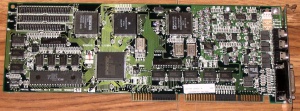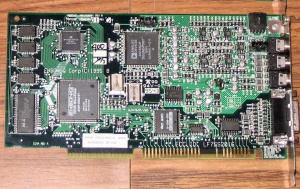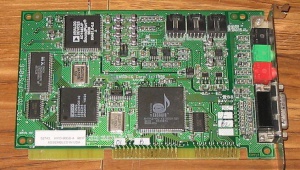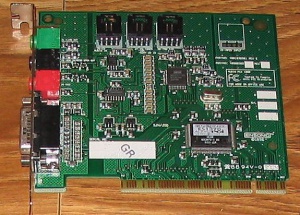Difference between revisions of "Ensoniq"
(→AudioPCI) |
|||
| Line 5: | Line 5: | ||
*Hardware-based MPU-401 support for great General MIDI compatibility | *Hardware-based MPU-401 support for great General MIDI compatibility | ||
| − | *16-bit 48 kHz PCM output | + | *16-bit 48 kHz PCM output in native Soundscape mode |
*2 megabyte compressed sample ROM | *2 megabyte compressed sample ROM | ||
*83db SNR | *83db SNR | ||
| Line 11: | Line 11: | ||
*Motorola 68k microcontroller removes need for drivers/TSRs. | *Motorola 68k microcontroller removes need for drivers/TSRs. | ||
*Sound Blaster 2.0, Adlib and WSS support | *Sound Blaster 2.0, Adlib and WSS support | ||
| − | *OPL2 emulation (poor translation to MIDI synth) | + | *OPL2 FM emulation (poor translation to MIDI synth) |
*MT-32 emulation (poor) | *MT-32 emulation (poor) | ||
| Line 18: | Line 18: | ||
This card is an OEM cost-reduced product with similar specifications to the S-2000 but with some changes. It uses the Analog Devices AD1848JP and an all-in-one MIDI chip called OPUS. It has some compatibility problems with games because of the use of I/O ports atypical for the S-2000 (games don't always support them). | This card is an OEM cost-reduced product with similar specifications to the S-2000 but with some changes. It uses the Analog Devices AD1848JP and an all-in-one MIDI chip called OPUS. It has some compatibility problems with games because of the use of I/O ports atypical for the S-2000 (games don't always support them). | ||
| + | *Hardware-based MPU-401 support for great General MIDI compatibility | ||
| + | *16-bit 48 kHz PCM output in native Soundscape mode | ||
*1 megabyte compressed sample ROM | *1 megabyte compressed sample ROM | ||
| + | *Panasonic, Sony and Mitsumi CD-ROM interfaces | ||
| + | *Motorola 68k microcontroller removes need for drivers/TSRs. | ||
| + | *Sound Blaster 2.0, Adlib and WSS support | ||
| + | *OPL2 FM emulation (poor translation to MIDI synth) | ||
| + | *MT-32 emulation (poor) | ||
*Plug'n'play support | *Plug'n'play support | ||
| Line 26: | Line 33: | ||
*Hardware-based MPU-401 support for great General MIDI compatibility | *Hardware-based MPU-401 support for great General MIDI compatibility | ||
| − | *Programmable ESP daughtercard (effects processor) | + | *Programmable "ESP" daughtercard (effects processor) |
| − | *16-bit 48 kHz PCM output | + | *16-bit 48 kHz PCM output in native Soundscape mode |
*2 megabyte compressed sample ROM | *2 megabyte compressed sample ROM | ||
*83db SNR | *83db SNR | ||
| Line 33: | Line 40: | ||
*Motorola 68k microcontroller removes need for drivers/TSRs. | *Motorola 68k microcontroller removes need for drivers/TSRs. | ||
*Sound Blaster 2.0, Adlib and WSS support | *Sound Blaster 2.0, Adlib and WSS support | ||
| − | *OPL2 emulation (poor translation to MIDI synth) | + | *OPL2 FM emulation (poor translation to MIDI synth) |
*MT-32 emulation (poor) | *MT-32 emulation (poor) | ||
| Line 41: | Line 48: | ||
*Requires EMM386.exe be loaded for DOS support | *Requires EMM386.exe be loaded for DOS support | ||
| + | *16-bit 48 kHz PCM output in native Soundscape mode | ||
*1 megabyte sample ROM | *1 megabyte sample ROM | ||
*90db SNR | *90db SNR | ||
| + | *Sound Blaster 2.0, Adlib and WSS support | ||
| + | *OPL2 FM emulation (poor translation to MIDI synth) | ||
| + | *MT-32 emulation (poor) | ||
===AudioPCI=== | ===AudioPCI=== | ||
| Line 50: | Line 61: | ||
When Creative purchased Ensoniq, a driver update was released renaming the card to Sound Blaster PCI 64. This also added some new features. In Windows 9x it has rudimentary DirectSound3D 4-speaker support and minimal A3D/EAX emulation. | When Creative purchased Ensoniq, a driver update was released renaming the card to Sound Blaster PCI 64. This also added some new features. In Windows 9x it has rudimentary DirectSound3D 4-speaker support and minimal A3D/EAX emulation. | ||
| − | *2 | + | *Requires EMM386.exe be loaded for DOS support |
| + | *16-bit 48 kHz PCM output in DOS with Soundscape mode | ||
| + | *2, 4 and 8 megabyte patch sets | ||
*host-based MIDI effects in Windows 9x | *host-based MIDI effects in Windows 9x | ||
*90db SNR | *90db SNR | ||
*Sound Blaster Pro 2.0, Adlib, General MIDI, WSS and Soundscape DOS support | *Sound Blaster Pro 2.0, Adlib, General MIDI, WSS and Soundscape DOS support | ||
| − | *poor | + | *OPL3 FM emulation (poor translation to MIDI synth) |
| + | *MT-32 emulation (poor) | ||
==Related links== | ==Related links== | ||
*[http://web.archive.org/web/19970607101326/http://www.ensoniq.com/html/multimedia_products.htm Ensoniq within Internet Archive] | *[http://web.archive.org/web/19970607101326/http://www.ensoniq.com/html/multimedia_products.htm Ensoniq within Internet Archive] | ||
Revision as of 07:33, 21 February 2013
Contents
Cards
Soundscape S-2000
Based upon the Otto and Sequoia MIDI chipset and an Analog Devices AD1848KP DAC/ADC, the Soundscape S-2000 was a high quality wavetable sound card in 1994.
- Hardware-based MPU-401 support for great General MIDI compatibility
- 16-bit 48 kHz PCM output in native Soundscape mode
- 2 megabyte compressed sample ROM
- 83db SNR
- Panasonic, Sony and Mitsumi CD-ROM interfaces
- Motorola 68k microcontroller removes need for drivers/TSRs.
- Sound Blaster 2.0, Adlib and WSS support
- OPL2 FM emulation (poor translation to MIDI synth)
- MT-32 emulation (poor)
Soundscape PnP / OPUS
This card is an OEM cost-reduced product with similar specifications to the S-2000 but with some changes. It uses the Analog Devices AD1848JP and an all-in-one MIDI chip called OPUS. It has some compatibility problems with games because of the use of I/O ports atypical for the S-2000 (games don't always support them).
- Hardware-based MPU-401 support for great General MIDI compatibility
- 16-bit 48 kHz PCM output in native Soundscape mode
- 1 megabyte compressed sample ROM
- Panasonic, Sony and Mitsumi CD-ROM interfaces
- Motorola 68k microcontroller removes need for drivers/TSRs.
- Sound Blaster 2.0, Adlib and WSS support
- OPL2 FM emulation (poor translation to MIDI synth)
- MT-32 emulation (poor)
- Plug'n'play support
Soundscape Elite
Essentially revision 2 of the S-2000, but with the addition of an effects DSP daughtercard and a revised sample ROM. Based upon the Otto and Sequoia MIDI chipset and an Analog Devices AD1848KP DAC/ADC. Released in 1995.
- Hardware-based MPU-401 support for great General MIDI compatibility
- Programmable "ESP" daughtercard (effects processor)
- 16-bit 48 kHz PCM output in native Soundscape mode
- 2 megabyte compressed sample ROM
- 83db SNR
- IDE, Panasonic, Sony and Mitsumi CD-ROM interfaces
- Motorola 68k microcontroller removes need for drivers/TSRs.
- Sound Blaster 2.0, Adlib and WSS support
- OPL2 FM emulation (poor translation to MIDI synth)
- MT-32 emulation (poor)
Soundscape VIVO 90
This card became the OEM favorite, replacing the OPUS card. It also was available at retail. It is less capable and less flexible than the large Soundscape boards based on Otto and Sequoia. It uses a chip named Mark 5.
- Requires EMM386.exe be loaded for DOS support
- 16-bit 48 kHz PCM output in native Soundscape mode
- 1 megabyte sample ROM
- 90db SNR
- Sound Blaster 2.0, Adlib and WSS support
- OPL2 FM emulation (poor translation to MIDI synth)
- MT-32 emulation (poor)
AudioPCI
The final sound card from Ensoniq is a very cost-reduced PCI card that is almost entirely host-driven (software-based). MIDI is a soft-synth in both Windows and DOS and has limitations that make it impossible to produce a patch set that rivals the older cards with 2 megabyte ROMs.
When Creative purchased Ensoniq, a driver update was released renaming the card to Sound Blaster PCI 64. This also added some new features. In Windows 9x it has rudimentary DirectSound3D 4-speaker support and minimal A3D/EAX emulation.
- Requires EMM386.exe be loaded for DOS support
- 16-bit 48 kHz PCM output in DOS with Soundscape mode
- 2, 4 and 8 megabyte patch sets
- host-based MIDI effects in Windows 9x
- 90db SNR
- Sound Blaster Pro 2.0, Adlib, General MIDI, WSS and Soundscape DOS support
- OPL3 FM emulation (poor translation to MIDI synth)
- MT-32 emulation (poor)




